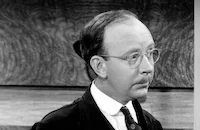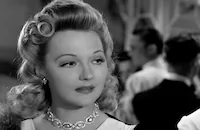There's Magic in Music
Cast & Crew
Andrew L. Stone
Allan Jones
Susanna Foster
Margaret Lindsay
Lynne Overman
Grace Bradley
Film Details
Technical Specs

Synopsis
While being interviewed on the radio by announcer Deems Taylor about the National Music Camp at Interlochen, Michigan, which provides a summer music training camp for talented children. Michael Maddy, loafer son of the camp's director, university professor Dr. Joseph E. Maddy, digresses and starts talking about Toodles LaVerne, a burlesque entertainer whom he claims is a legitimate opera singer. After the producers pull him off the broadcast, Michael makes a wager with his friend, George Thomas, the publicity agent for the Manhattan Opera Company, that Toodles is an opera singer. Michael wins the bet when George attends the burlesque show and Toodles sings a variation on an Italian opera. When the theater is raided by police, Toodles' dance partner, Maidie Duvalle, is caught, but Toodles escapes into Michael and George's limousine. Michael takes pity on the teenager and brings her to his apartment, where she changes from her risqué costume into regular clothes. Michael and George discover that the orphan Toodles taught herself to sing by listening to records. Duly impressed by her voice and her fear of being remanded to a reform school, Michael gets himself appointed as Toodles' guardian and takes her to Interlochen. Upon arriving there, Michael, who has taken over the camp because of his father's illness, asks Sylvia Worth, the camp's new efficiency expert, to give Toodles a scholarship. Sylvia is initially resistant because the school is in financial difficulty and the Board of Directors has threatened to withdraw its funding at even the hint of a problem. Toodles, meanwhile, befriends fourteen-year-old Heimo Haitto, a war refugee from Finland who is a talented violinist. When bully William Chapman picks on Heimo, Toodles sticks up for him and knocks Bill out. Heimo then accompanies Toodles to her cabin, where she meets her roommates: singing pianist Dolly Loehr, singing violinist Kaye Connor, and violinist Patricia Travers, who would rather spend the summer at the beach. Toodles is awestruck by her talented bunkmates, but shows no interest in learning to read music or participating in camp activities. Later Sylvia is surprised when Michael and George admit that they "recruited" Toodles from a burlesque show and that she is on parole from a reform school. Although Sylvia worries that Toodles' inferior background could sully the reputation of the camp, she lets her stay. Despite Toodles' screams and cries, Michael and George forcibly wash the make-up off her face and insist that she wear a uniform. Later that night, Michael urges her to perform for the rest of the students, who happily accept the new recruit when she proves her singing ability. Michael then insists that Toodles learn to read music so she can audition with the rest of the school for a benefit with the Manhattan Opera Company. When Bill finds out that Toodles is on parole from reform school, he spreads the news to the rest of the students. Toodles finds she has loyal friends in Heimo, Dolly, Pat and Kaye, who offer to teach her how to read and interpret music. When Manhattan Opera representatives arrive early for the audition, Kaye pretends to have laryngitis so that Toodles will be compelled to perform, even though she is not familiar with the music. Toodles delights everyone when she proves her sight reading skills, and the Manhattan Opera representatives are greatly impressed. Later, however, Toodles decides to leave the camp after Maidie publishes an article about Toodles, which creates bad publicity for the school. As a result, many parents withdraw their children, and the financial backers threaten to withdraw their support. Presuming that Toodles had the article printed out of malice, Sylvia confronts the teenager before she leaves, but realizes she is wrong when she overhears Maidie apologizing for causing so much grief. Toodles then returns to New York with Maidie, and Sylvia follows her, intending to lure the financiers back. When Michael learns of the chain of events, he and a group of Toodles' closest friends from the camp go to New York and insist that she sing with them at the Manhattan Opera show. Toodles agrees, and Bill apologizes for misjudging her. That night, Toodles' soaring voice and the talent of Michael and the students shine through, and the financial backers renew their promise to support the camp.

Director

Andrew L. Stone
Cast

Allan Jones
Susanna Foster

Margaret Lindsay

Lynne Overman
Grace Bradley
William Collier Sr.
Heimo Haitto
Kaye Connor
William Chapman

Dolly Loehr
Patricia Travers
Richard Bonelli
Richard Hageman
Irra Petina
Tandy Mackenzie

Fay Helm
Esther Dale
Deems Taylor
"baby" Mary Ruth Kizziar
Fred Hoose
Ottola Nesmith
Bertram Marburgh
Ruth Robinson

Hobart Cavanaugh
Ruth Rogers
Bert Roach

Emmett Vogan
Charles Bimbo
Sid D'albrook
Russ Coller
Jane Keckley
Carol Holloway
Hayden Stevenson
The California Junior Symphony Orchestra

Astrid Allwyn

Rosella Towne

Jean Porter
Elena Verdugo
Adele Horner
Aryel Keys
Crew
Jules Barbier
Georges Bizet
René Boisdeffre
Phil Boutelje
Johannes Brahms
Michel Carré
John Cope
Russel Crouse
Hans Dreier
Charles Gounod
Edvard Grieg
Ludovic Halévy
Edith Head
Earl Hedrick
Frederick Hollander
Frederick Jackson
Richard Kountz
William Lebaron
Edwin Lester
Edwin Lester
Franz Liszt
Robert Lively
Dr. Joseph E. Maddy
Joseph Mccarthy
Henri Meilhac
Peter Meremblum
Giacomo Meyerbeer
Harry Mills
James V. Monaco
John H. Morse
Eddie Newton
Abe Olman
Leroy Prinz
Ann Ronell
Ann Ronell
Ed Ross
Anton Rubinstein
Bob Russell
Franz Schubert
Clinton Scollard
T. Lawrence Seibert
James Smith
John Philip Sousa
Theodor Sparkuhl
Oley Speaks
Andrew L. Stone
Andrew L. Stone
Richard Strauss
Ivor Tehervanow
Richard Wagner

Film Details
Technical Specs

Quotes
Trivia
Notes
The first two reels of this film was not viewed; opening credits were derived from a release dialogue script at the AMPAS Library. The order of these screen credits differs significantly from the onscreen end credits. The opening credits contain the following statement: "The children in this picture actually performed the musical numbers as shown." The working titles of the film were Interlochen and Magic in Music. The film was initially released in March 1941 as The Hard-Boiled Canary; however, according to Hollywood Reporter, Paramount retitled and re-released the film with a new publicity campaign in May 1941.
According to information in the Paramount Collection at the AMPAS Library, Paramount purchased Ann Ronell's option on the exclusive story rights to the National Music Camp in December 1939. In the spring of 1940, Paramount executives proposed a tie-in with the Metropolitan Opera Company of New York City, which was trying to raise one million dollars for preservation, but the idea was apparently vetoed. Exteriors for the film were shot on location at Lake Arrowhead, CA, according to production files. Hollywood Reporter also notes that the "outdoor bowl" at Interlochen was recreated at the studio. According to the Daily Variety review, a choral group from the University of Southern California performed in the film. The National Music Camp at Interlochen, MI, was founded in 1928 by Michigan University professor Dr. Joseph E. Maddy, and still serves as a summer training ground for young classical musicians.












